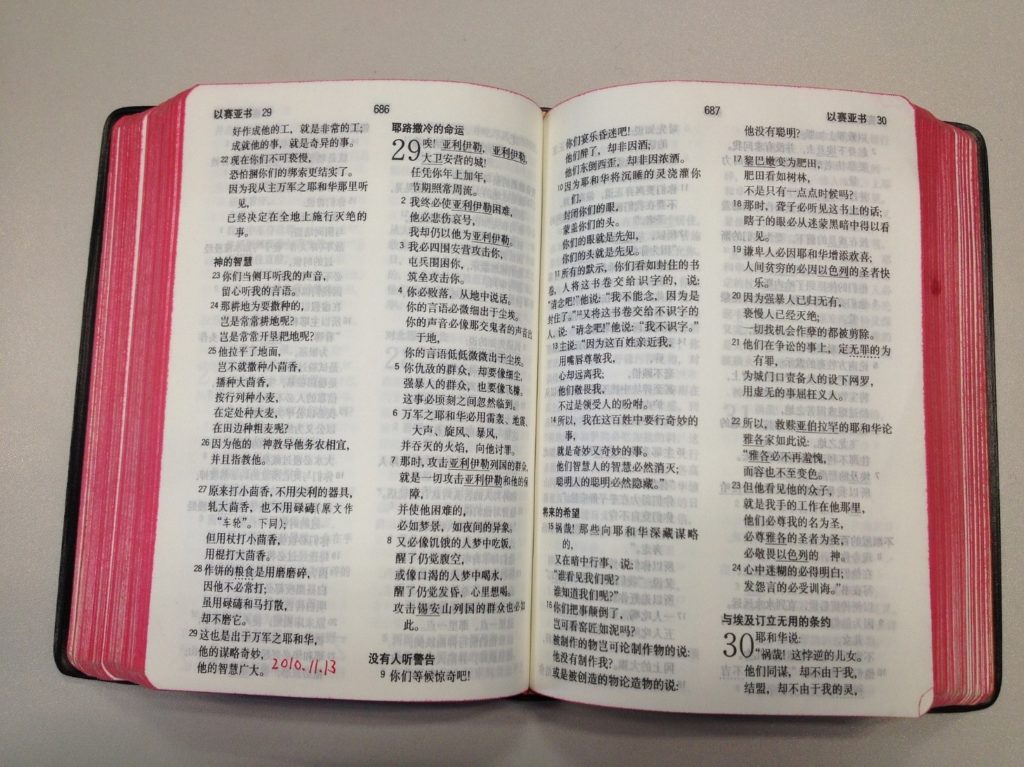HENAN PROVINCE – On November 30, 2018, Chinese communist authorities ordered a church in Henan Province to remove its display of the first commandment of the Ten Commandments. The directive came during a regular inspection of a church affiliated with the government-approved Three-Self church movement.
Freedom of religion in China has been a consistent and growing concern under the government’s ‘Sinicization’ campaign.

As recently as a week ago, Missions Box reported on the alleged persecution of Christians and Muslims alike under the program. In December, we reported the story of the imprisonment of the pastor and parishioners of the Early Rain Covenant Church in Chengdu. (The pastor, his wife, and some church members remain imprisoned as of this date.)
In July 2018, officials closed and barricaded the 1,600-member Zion Church, the largest house church in China. A house church in China is simply an unregistered church, i.e., a church that wishes to remain independent of government control. House churches are not allowed to own buildings or maintain bank accounts. It is estimated that there are more than 5,000 Chinese house churches with a membership of 50 or more.
As the 30-member team of ‘patrol inspectors’ toured the church in Henan one of them stopped in front of a display of the Ten Commandments and ordered church officials to remove the First Commandment – “Thou shalt have no other gods before me.”
The inspector explained that President Xi Jinping “opposes the statement” and that “If anyone doesn’t agree, they are fighting against the country.”
The Chinese position is that,
Generally speaking, modern countries are secular and diverse in a globalized world. But the revival and spread of religion have somewhat impacted secular society. Fundamentalism has caused more religious violence and religious nationalism is threatening countries’ legitimate governments and leading to social instability.
De-extremization and freedom of religious belief are entirely different, and Islam and socialist society are not incompatible. Cracking down on extremism and guiding religions to be compatible with socialism are not the so-called “violation of freedom of religion.”
The unity that Chinese officials seek begins with their concern that to protect their culture, citizens of any religious preference must first worship the Communist Party before they worship God.
A spokesman for a local poverty alleviation project of the People’s Congress recently told the South China Morning Post that,
Many rural people are ignorant. They think God is their savior. We tried to tell them . . . they should no longer rely on Jesus, but on the Party for help.
The official explained that, once the Party’s poverty alleviation program is complete, “they will realize their mistakes” and learn to rely on the government for help.
In conjunction with this story, on January 6th, China passed a five-year plan to Sinicize Islam within its borders. The Global Times call it “China’s important act to explore ways of governing religion in modern countries.”
It added that “Governing religion is a common challenge faced by all modern countries. The main purpose of China’s five-year plan to Sinicize Islam is to seek governance that tallies with Chinese practice – and it is not only limited to Islam.”
To read more news on China on Missions Box, go here.
Sources:
- The Christian Post, China forces church to take down first commandment given to Moses
- The Gospel Herald, China Forces Church to Remove First Commandment from Wall, Warn: ‘Don’t Go Against The Government’
- Faith Wire, Chinese Officials Wipe Away First Commandment From Church Display Because It Challenges Power of President
- Christian Today, In chilling move, Chinese official erases First Commandment
- Bitter Winter, In China, Moses Delivers Only Nine Commandments
- Global Times, China explores effective governance of religion in secular world




